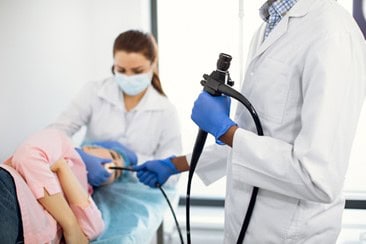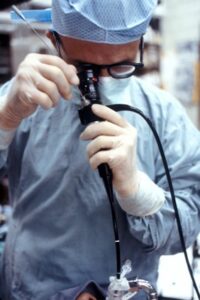
27 Nov GI Screenings That Save Lives
Gastrointestinal (GI) cancers include a variety of malignancies impacting the digestive system, such as colorectal, stomach, esophageal, pancreatic, and liver cancers. Early detection is crucial for improved survival rates, as cancers identified in their initial stages are often more treatable. Regular screenings, typically advised and conducted by a gastroenterologist, play a key role in this early detection. Understanding the available tests, how each functions, and who should undergo screening can ultimately save lives.
The Importance of GI Cancer Screenings
Screenings for GI cancers aim to identify abnormal tissue or cancer before symptoms arise. Many early-stage cancers often have no symptoms or very subtle signs, making proactive screening essential. When GI cancers are detected early, they are typically easier to treat and manage, often leading to better outcomes and increased survival rates. Preventive screenings can also detect precancerous growths (polyps), allowing doctors to remove them before they develop into cancer.
Common Screening Tests for GI Cancers
In the areas of Scarsdale, Harrison, and White Plains, providers are offering various screening options are designed to detect specific types of gastrointestinal (GI) cancers. Each test differs in terms of accuracy, invasiveness, and recommended frequency. Here’s an overview of some of the primary tests utilized for screening GI cancers, emphasizing their importance in early detection and effective treatment.
Colonoscopy
Colonoscopies are the primary screening tool for detecting colorectal cancer, allowing for both the identification and removal of polyps or cancerous growths in the colon and rectum. During this procedure, the doctor inserts a flexible tube with a camera into the rectum to thoroughly inspect the entire colon, removing biopsy samples of any suspicious tissue.
Most guidelines recommend that average-risk individuals begin screening at age 45. Those with higher risk factors, such as a family history of colorectal cancer, may need to begin screening earlier. For average-risk individuals, the procedure is advised every 10 years, although those with polyps or other risk indicators may require more frequent screenings.
Fecal Immunochemical Test (FIT)
The FIT (Fecal Immunochemical Test) is an accessible, at-home screening tool for detecting hidden blood in stool, which may signal colorectal cancer. This test involves collecting a small stool sample and sending it to a lab for analysis. For those aged 45 and older with an average risk of colorectal cancer, the FIT can serve as an alternative to a colonoscopy. Due to its focus on recent bleeding rather than long-term changes in colon health, it’s recommended annually for reliable monitoring.
Stool DNA Test
This test analyzes stool for DNA markers associated with colorectal cancer and high-risk precancerous polyps, detecting mutations that indicate potential cancer. Like the FIT, it’s an at-home test where samples are collected and sent to a lab for analysis. Screening is generally recommended beginning at age 45 for those with an average risk. If results are negative, the test can be repeated every three years. However, a positive result usually requires a follow-up colonoscopy to examine the colon in more detail and confirm findings.
Additional Testing Options
The esophagogastroduodenoscopy (EGD) is a vital test that screens for cancers affecting the esophagus, stomach, and small intestine, such as esophageal and stomach cancers. During the procedure, a thin, flexible tube equipped with a light and camera, known as an endoscope, is inserted through the mouth and carefully guided down the digestive tract. This allows healthcare providers to visually examine the upper gastrointestinal (GI) tract for any abnormalities or signs of cancer.
This test is particularly recommended for individuals who exhibit risk factors, including chronic acid reflux, Barrett’s esophagus, celiac disease, or a family history of GI cancers. The frequency of the EGD is typically determined by a healthcare provider, often based on the individual’s specific symptoms or risk factors.

Similarly, imaging tests like CT scans, MRIs, and endoscopic ultrasounds (EUS) play a crucial role in detecting cancers of the pancreas, liver, and biliary tract. EUS, in particular, can aid in guiding biopsies of pancreatic tissue to confirm a diagnosis. Individuals at high risk for these cancers—such as those with a family history, certain genetic conditions, or chronic pancreatitis—should consult with their healthcare provider to determine if imaging tests are appropriate. In many cases, doctors may recommend annual imaging for those deemed high risk.
Another innovative diagnostic tool is capsule endoscopy, which allows for examination of the small intestine—an area that standard endoscopies may not reach effectively. This method is especially beneficial for detecting small intestine cancers.
During this procedure, patients swallow a small capsule containing a camera that captures images as it travels through the GI tract. Capsule endoscopy is generally recommended for patients experiencing unexplained GI bleeding or symptoms that remain undiagnosed after other tests. The frequency of this test is determined based on clinical findings and the individual patient’s circumstances.
Who Should Get Screened?
The necessity and frequency of screening vary based on several factors:
Age: Individuals over 45 should generally start screening for colorectal cancer. Upper GI cancer screenings are not usually recommended for average-risk individuals unless symptoms or risk factors are present.
Family History: Those with a family history of GI cancers should begin screening earlier and may require more frequent tests.
Lifestyle Factors: Smoking, excessive alcohol use, obesity, and a diet high in processed meats increase the risk of GI cancers, making regular screenings especially important.
Genetic Conditions: Individuals with Lynch syndrome, familial adenomatous polyposis (FAP), or other genetic syndromes require earlier and more frequent screenings.
Conclusion
GI cancer screenings are powerful tools in the fight against cancer. From colonoscopies that catch colorectal cancer early to endoscopies and imaging tests that reveal esophageal, pancreatic, and liver cancers, these screenings save lives by identifying cancer before it spreads. Whether you are at average or increased risk, talk to your healthcare provider about the best screening options for you. By taking a proactive approach, you can help ensure a healthier future.



